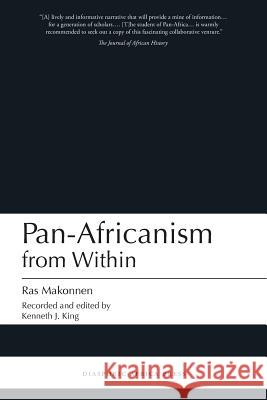Pan-Africanism from Within » książka
Pan-Africanism from Within
ISBN-13: 9781937306441 / Angielski / Miękka / 2016 / 320 str.
A Guyanese by birth and a Kenyan by citizenship, Ras Makonnen would still regard these two aspects of his life as accidents of history--his roots and destiny are in the continent of Africa. For the last half of the twentieth century, he has striven, along with the other major architects of pan-Africanism, to reconcile the forces that still divide the continent. This volume is a further contribution to that struggle. Makonnen's analysis of the pan-African movement starts in the former British Guiana (Guyana) in the early twenties, warms up to the North American scene where, as a young man, he got increasingly more aware of the African and diasporic African person's position in world history. He then describes his days in London and Manchester from the mid-thirties to the fifties; Accra (Ghana) until the fall of Kwame Nkrumah in 1966 and thereafter Nairobi (Kenya), where he worked and made his transition. Although the narrative is peppered with the most delightful character sketches of early African and other Black leaders, the author's main concern is to interpret the quality of life amongst Black people at home and abroad. He does so by employing a wide historical perspective and by infusing into his study of particular pan-African actors his knowledge of the intellectual and political climate at large. He produces in the process a vivid participator's commentary on whole areas that have been quite neglected in conventional studies of pan-Africanism. Black intergroup relations in North America and the African diaspora in the Caribbean; race relations in Britain; Black intellectuals and the white Left; Black expatriates and African socialism--these are just a few of the themes examined against a background of individual famous personalities as well as others not documented before. With an autobiographical thread that runs throughout, Makonnnen's narrative is a uniquely diversified pan-African portrait.
A Guyanese by birth and a Kenyan by citizenship, Ras Makonnen would still regard these two aspects of his life as accidents of history—his roots and destiny are in the continent of Africa. For the last half of the twentieth century, he has striven, along with the other major architects of pan-Africanism, to reconcile the forces that still divide the continent. This volume is a further contribution to that struggle. Makonnen’s analysis of the pan-African movement starts in the former British Guiana (Guyana) in the early twenties, warms up to the North American scene where, as a young man, he got increasingly more aware of the African and diasporic African person’s position in world history. He then describes his days in London and Manchester from the mid-thirties to the fifties; Accra (Ghana) until the fall of Kwame Nkrumah in 1966 and thereafter Nairobi (Kenya), where he worked and made his transition.Although the narrative is peppered with the most delightful character sketches of early African and other Black leaders, the author’s main concern is to interpret the quality of life amongst Black people at home and abroad. He does so by employing a wide historical perspective and by infusing into his study of particular pan-African actors his knowledge of the intellectual and political climate at large. He produces in the process a vivid participator’s commentary on whole areas that have been quite neglected in conventional studies of pan-Africanism. Black intergroup relations in North America and the African diaspora in the Caribbean; race relations in Britain; Black intellectuals and the white Left; Black expatriates and African socialism—these are just a few of the themes examined against a background of individual famous personalities as well as others not documented before. With an autobiographical thread that runs throughout, Makonnnen’s narrative is a uniquely diversified pan-African portrait.











